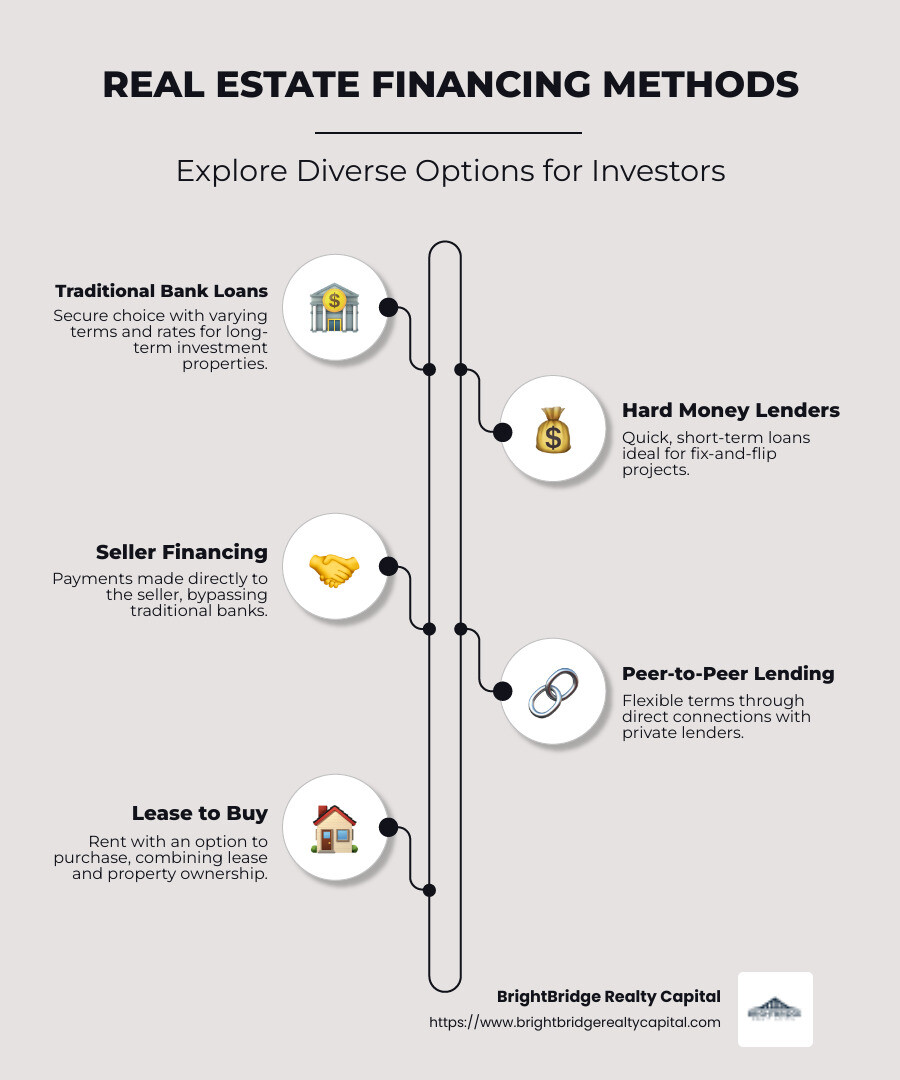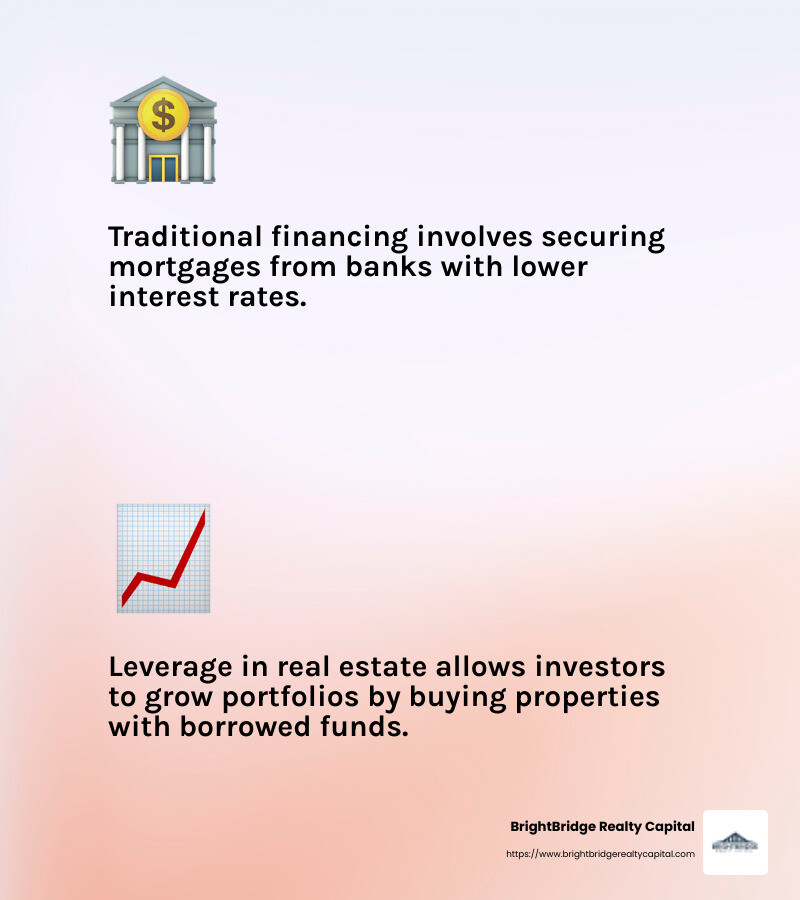Financing Your Real Estate Dreams: A How-To Guide for Investors

How do real estate investors get financing? In real estate investing, securing the right financing is essential for turning dreams into reality. There are numerous ways that investors can obtain the necessary funds to purchase investment properties and seize financial opportunities. Here’s a quick look at several common strategies:
- Traditional Bank Loans: Often seen as a secure choice, these loans come with varying terms and rates.
- Hard Money Lenders: These are quick, short-term loans typically used for fix-and-flip projects.
- Seller Financing: Allows direct installment payments to the seller, bypassing traditional lenders.
- Peer-to-Peer Lending: Connects individual borrowers with private lenders for flexible terms.
- Lease to Buy: Offers a chance to rent the property with the option to purchase later.
The prospect of investing in real estate is tantalizing. However, the truth is that obtaining financing can be a hurdle, especially for investors seeking quick and reliable solutions. With housing prices having surged in recent years and mortgage rates fluctuating, navigating the financial landscape can be tricky. Investors must explore various financing paths to determine the one best suited to their needs and goals.
Real estate holds the promise of financial growth through diverse opportunities—whether through rental income or property value appreciation. Deciphering the right financing method is vital. It can make all the difference in capitalizing on hot market opportunities or expanding an investment portfolio with ease and speed.

Handy how do real estate investors get financing terms:
- creative financing for real estate investors
- real estate funding process
- real estate investor financing
Understanding Real Estate Financing
Real estate financing is the backbone of any property investment. It’s about finding the right way to fund your real estate dreams. At its core, financing involves leveraging borrowed funds to purchase property, allowing investors to grow their portfolios without needing all the cash upfront.
Traditional Financing
Traditional financing usually means getting a mortgage from a bank or a financial institution. These loans often have lower interest rates because they are secured by the property itself. Banks typically require a good credit score and a substantial down payment.

Leverage
Leverage is a powerful tool in real estate. It allows investors to buy properties using a combination of their own money and borrowed funds. By using leverage, investors can control more assets with less personal capital. This can amplify returns—both positive and negative. For example, if a property increases in value, the investor benefits from the appreciation on the entire property, not just their initial investment.
Cash Flow
Cash flow is the net income from a real estate investment after all expenses have been paid. Positive cash flow means the property generates more income than it costs to maintain, which can provide ongoing income for the investor. This is often a key goal for real estate investors, as it ensures the property is not only self-sustaining but also profitable.
In summary, understanding the basics of real estate financing—traditional financing, leverage, and cash flow—is essential for any investor looking to thrive in the market. These elements are foundational to making smart investment decisions and maximizing returns.
How Do Real Estate Investors Get Financing?
When it comes to financing real estate investments, investors have a variety of options. Whether you're just starting out or looking to expand your portfolio, understanding these options is crucial.
Traditional Bank Loans
Traditional bank loans are often the first stop for many investors. These loans are offered by banks and financial institutions and are secured by the property itself. They usually come with lower interest rates compared to other financing options. However, they require a good credit score and a sizable down payment, often around 20% or more, depending on the lender's requirements.

Customized Lending Solutions
For those who might not fit the mold of traditional bank loans, customized lending solutions can be a game-changer. These solutions are custom to meet the unique needs of individual investors. For example, BrightBridge Realty Capital offers customized loan solutions that cater to specific investment strategies, whether you're flipping houses, building new properties, or growing a rental portfolio. These loans can provide flexibility in terms of terms and conditions, making them a viable option for many investors.
Direct Lending
Direct lending is another popular option, especially for those looking to close deals quickly. Unlike traditional banks, direct lenders like BrightBridge Realty Capital offer a more streamlined process. This means faster approval times and the ability to close deals in as little as a week. This can be particularly beneficial in competitive markets where speed is of the essence.
Understanding how do real estate investors get financing involves exploring a mix of traditional bank loans, customized lending solutions, and direct lending. Each option offers its own set of advantages, and the best choice often depends on the investor's specific needs and circumstances.
Top Real Estate Financing Options
When it comes to financing real estate investments, there are several paths an investor can take. Let's explore some of the top options available:
Traditional Mortgage Loan
A traditional mortgage loan is one of the most common ways investors finance properties. These loans are typically offered by banks and require a stable credit score and a down payment, generally around 20%. The benefit is often lower interest rates, which can make monthly payments more manageable.
Home Equity Loan
If you already own property, a home equity loan can be a smart way to leverage your existing equity. This type of loan allows you to borrow against the value of your home. It's ideal for those looking to finance additional investment properties without selling current assets.
FHA Loan
FHA loans are backed by the Federal Housing Administration and are popular among those who may not have a high credit score or a large down payment. They offer more flexible lending terms, which can be beneficial for first-time investors.
Conforming Loan
A conforming loan follows the guidelines set by the Federal Housing Finance Agency. These loans have limits on the amount you can borrow, but they often come with favorable terms for those who qualify.
203K Loan
For investors interested in rehabilitating older properties, a 203K loan could be the answer. This loan is backed by the FHA and allows you to finance both the purchase and renovation of a property in one loan.
Portfolio Loan
A portfolio loan stays with the original lender instead of being sold on the secondary market. This can be advantageous for investors who prefer to maintain a relationship with their lender and may result in more favorable terms.
Lease to Buy
In a lease to buy arrangement, you rent a property with the option to purchase it later. This can be a strategic way to secure a property while building the necessary funds for a down payment.
Cash Financing
Cash financing is straightforward—buying a property outright without a loan. This method eliminates monthly payments and can give investors a competitive edge in bidding wars.
Self-Directed IRA Accounts
Investors with a self-directed IRA can use it to purchase real estate. This option allows for tax-deferred growth but may come with penalties if funds are withdrawn before retirement age.
Seller Financing
Seller financing involves the seller acting as the lender. This can speed up the transaction process and may be attractive to buyers who want to avoid traditional bank fees.
Peer-to-Peer Lending
Peer-to-peer lending connects borrowers directly with investors through online platforms. It can offer lower interest rates and more flexible terms compared to traditional loans.
VA Loan
For military veterans and their families, a VA loan is an excellent option. These loans are guaranteed by the U.S. Department of Veterans Affairs and often require no down payment or private mortgage insurance.
Each of these financing options has its own set of benefits and requirements. The best choice depends on your individual circumstances and financial goals. By understanding these options, you can make informed decisions and take strategic steps toward achieving your real estate investment dreams.
Creative Financing Strategies
When it comes to how do real estate investors get financing, thinking outside the box can be incredibly beneficial. Let's explore some creative financing strategies that might just be the perfect fit for your investment needs.
Crowdfunding
Crowdfunding has revolutionized the way investors can pool resources to fund real estate projects. Platforms allow multiple investors to contribute smaller amounts, reducing individual risk while gaining access to larger properties. Since the 2012 JOBS Act, this method has become more accessible, enabling investors to participate with as little as $1,000. However, keep in mind that this comes with shared ownership and control, and potential fees.
Partnerships
Partnerships involve teaming up with like-minded individuals to jointly invest in properties. This approach can significantly lower the capital each partner needs to contribute and spread the risk. But, it requires shared decision-making and responsibilities. Finding partners who align with your investment goals is crucial to avoid conflicts and ensure a successful venture.
Customized Financial Solutions
Customized financial solutions are custom to meet unique investment needs. These solutions can be crafted through flexible loan terms, interest-only periods, or adjustable payment plans. For instance, BrightBridge Realty Capital offers custom rental loans that cater to specific strategies, whether you're scaling your portfolio or diving into niche markets like short-term rentals. This flexibility can bridge the gap between your current position and where you aim to be.
Innovative Lending Strategies
Innovative lending strategies push the boundaries of traditional financing. Options like seller financing, where the seller acts as the lender, can expedite transactions and offer flexibility. Peer-to-peer lending is another innovative approach, connecting borrowers directly with investors online, often at lower interest rates. These strategies may involve more risk but can be advantageous for those who may not qualify for conventional loans.
By exploring these creative financing strategies, you can find the right mix of options to match your investment goals and financial situation. With a strategic approach, you can maximize your real estate opportunities and achieve your dreams.
Next, let's address some frequently asked questions about real estate financing to further improve your understanding and guide you in making informed decisions.
Frequently Asked Questions about Real Estate Financing
What is real estate financing?
Real estate financing is the process of securing funds to purchase property. This can be for personal use, investment, or development. The funds typically come from a variety of sources, including traditional banks, private lenders, or even creative solutions like crowdfunding. The goal is to find the best financing option that suits your needs, whether you're buying a home or investing in a rental property.
What are some common ways to secure real estate financing?
Securing real estate financing can be achieved through several avenues:
Traditional Bank Loans: These are the most common, often involving a lengthy application process but offering lower interest rates. They're ideal for those with strong credit histories.
Private Lenders: These lenders offer fast financing with looser qualifying requirements. However, they come with higher interest rates and shorter loan terms.
Seller Financing: In this setup, the seller acts as the lender, allowing for more flexible terms. This can be a great option if you have credit challenges.
Crowdfunding: By pooling resources with other investors, you can fund a real estate project with a smaller personal investment. This method has gained popularity since the 2012 JOBS Act.
Partnerships: Collaborating with other investors can reduce your capital needs and spread risk. However, it requires shared decision-making and responsibilities.
These options each have their pros and cons, so it's crucial to evaluate them based on your financial situation and investment goals.
What other opportunities are there to learn more about real estate finance?
To deepen your understanding of real estate finance, consider exploring the following resources:
Online Guides and Articles: Websites like Investopedia and BiggerPockets offer comprehensive guides on different financing options and strategies.
Courses: The University of San Diego provides courses focused on real estate finance, including a Real Estate Finance, Investments, and Development Certificate program.
Books and eBooks: Download resources like the "8 Questions to Ask When Evaluating a Real Estate Certificate Program for Career Advancement" to gain insights into real estate education paths.
Workshops and Seminars: Attend industry events to learn from experts and network with other investors.
By leveraging these resources, you can build a solid foundation in real estate finance, helping you make informed decisions and reach your investment goals.
Conclusion
At BrightBridge Realty Capital, we understand that real estate financing can be complex. That's why we offer customized solutions custom to meet your unique needs. Whether you're investing in a fix-and-flip, starting a new construction project, or building a rental portfolio, our goal is to make the process as smooth and efficient as possible.
Our commitment to fast closings sets us apart. We know that timing is crucial in the real estate market, so we work diligently to close deals often within a week. This speed allows you to seize opportunities as they arise, without the delays that can come with traditional bank loans.
We pride ourselves on our direct lending approach. By cutting out intermediaries, we offer competitive rates and a seamless process from start to finish. Our team of experts is dedicated to guiding you through every step, ensuring you have the support and information needed to make informed decisions.
With our nationwide reach, we're here to support real estate investors across the country. Whether you're in New York or anywhere else, BrightBridge Realty Capital is your partner in achieving your real estate dreams.
Ready to explore your financing options? Find how we can help and take the next step toward your investment goals.


